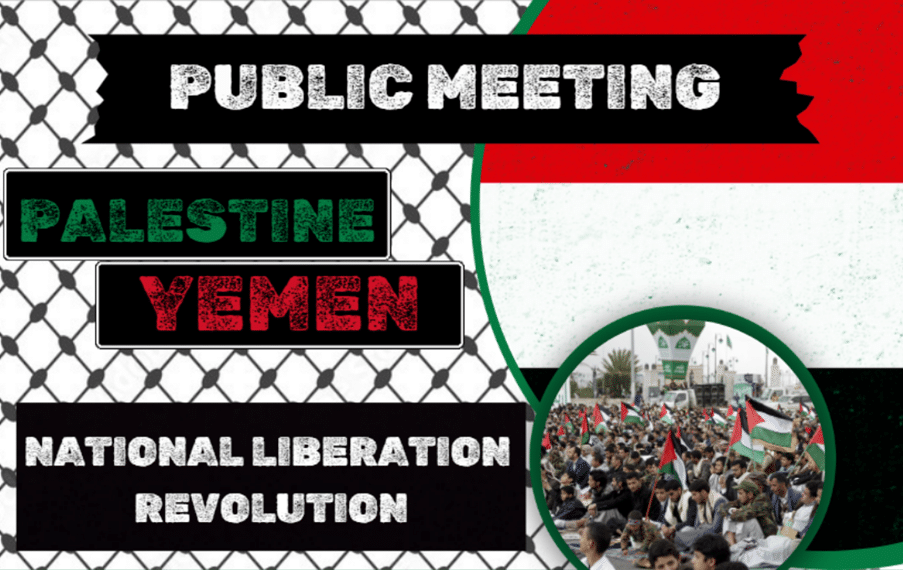On 25 September, West London supporters of Fight Racism! Fight Imperialism! held a public meeting titled ‘Palestine – Yemen – National Liberation Revolution!’, discussing the history and politics of the movements challenging imperialism in the Middle East with a focus on the Popular Front for the Liberation of Palestine (PFLP)* and Yemen’s Ansar Allah (referred to as ‘the Houthis’ in mainstream Western media).
Our first introduction on the PFLP covered the Palestinian right to resist their occupiers by any means necessary, drawing on the practical and theoretical contributions of George Habash, Ghassan Kanafani and Leila Khaled, as well as the Martiniquais Marxist psychologist Frantz Fanon. Our comrade shared the demands that the PFLP have raised to the new British Labour government:
- Reconsider the classification of Palestinian resistance on the terrorist lists, as resistance is a legitimate right for any people under occupation.
- Stop the operations of “israeli” companies in Britain, especially “israeli” arms factories like Elbit Systems, which contribute to Zionist genocide.
- Apologise for the Balfour Declaration and recognize it as a mistake as a first step towards atoning for the crime of the century committed against the Palestinian people.
- Cease colonial policies in the region and [do] not participate in the axis of evil led by the United States, especially in Yemen and other countries. We in the Front call for the continuation of popular activities, marches and sit-ins and for developing and expanding comprehensive boycott campaigns against the Zionist entity and its supporters in Britain.
The second speaker covered the Yemeni solidarity with Palestine, led by the Ansar Allah movement. Their military action against the genocidal Zionist campaign in Gaza, particularly the Red Sea blockade, remains steadfast even in the face of brutal reprisals at the hands of Britain, Israel and the USA. The comrade explained this in the context of Yemen’s revolutionary history. In their manifesto, National Vision for the modern Yemeni state, Ansar Allah identify themselves with five key dates:
- 26 September 1962: Declaration of Yemen Arab Republic
- 14 October 1963: Launch of South Yemen liberation
- 30 November 1967: Liberation of South Yemen
- 22 May 1990: Unification of Yemen
- 21 September 2014: Battle of Sana’a
Each of these dates marks a turning point in the Yemeni struggle for sovereignty, against imperialism and in particular British imperialism.
26 September 1962 marked the start of the North Yemen ‘civil war’, where a coalition including Israel, Saudi Arabia, Jordan, Iran under the Shah and Pakistan, prolonged a devastating proxy war that killed some 200,000 Yemenis. This coalition was backing the forces of feudalism and reaction around the North Yemen monarchy- Britain provided arms, financial backing, training and equipping of the Jordanian air force, and death squads formed by officially demobilised SAS commandos. This coalition was eventually defeated by North Yemeni republicans with support from Egypt. In public, Prime Minister Alec Douglas-Home told parliament that
‘our policy in Yemen is one of non-intervention in the affairs of that country. It is not therefore our policy to supply arms to the royalists in the Yemen’.
In private, Prime Minister Harold MacMillan told US president John F Kennedy:
‘ I quite realise that the loyalists will probably not win in Yemen in the end but it would not suit us too badly if the new Yemeni regime were occupied with their own internal affairs during the next few years’.
What Britain wanted, MacMillan added, was
‘a weak government in Yemen not able to make trouble.’
The liberation struggle of South Yemen from 14 October 1963 to 30 November 1967 freed that territory from more than a century of British colonialism and gave birth to the first, and so far only, socialist state in the Arab world- the People’s Democratic Republic of Yemen. **
Yemen’s eventual legal unification, 22 May 1990, marked the first time it had been unified since the British annexation of Aden in 1839. The talk also covered the rise of the Ansar Allah movement in this period, against the increasingly corrupt government of Ali Abdullah Saleh.
This movement seizes power in Sana’a, Yemen’s capital, on 21 September 2014– this prompts the coalition including Britain, the United States, Saudi Arabia, and the UAE to launch a brutal war and sanctions regime against Yemen, which claimed at least 380,000 lives.***
Following the introductions there was a lively open discussion that touched on topics such as our rights to speak on resistance movements in Britain, the consequences of the present war and how we can build the strongest possible movement to smash Britain’s support for Zionism.
Sanctions on Israel! Isolate the Zionist state! End the war on Yemen! Victory to the resistance!
-West London branch
* See ‘Palestine, from the river to the sea’: interview with PFLP Gaza
** See our article Repression and torture: the British Labour Party and the liberation struggle in South Yemen
*** See our article Yemen: a deceptive peace on this war




